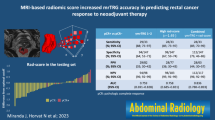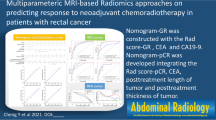Abstract
Purpose
Increasing studies have focused on neoadjuvant chemotherapy (NCT) in rectal cancer. However, few studies explored the differences in radiographic variation between patients treated with NCT and neoadjuvant chemoradiotherapy (NCRT).
Methods
Stage II/III rectal cancer patients from March 2016 to December 2019 meeting the criteria treated with NCRT or NCT were included. MRI features, including tumor location, longitudinal length, DWI signal, MRI tumor regression grade (mrTRG), and radiomic texture features, before and after neoadjuvant treatments were reviewed.
Results
116 patients with NCRT and 61 with NCT were analyzed. Among these patients, 46 patients in the NCRT group and 18 in the NCT group were responders with pathological TRG0-1. Within these responders, the mean tumor longitudinal length regression rate (TLRR) of the NCT group was 60.08 ± 11.17%, which was significantly higher than the 50.73 ± 15.28% of the NCRT group (p = 0.010). The proportion of high signal in the DWI image after NCT was higher than that of the NCRT group (88.89% vs 50.00%, p = 0.004). NCT responders had significantly higher median change rates than those of NCRT responders in 11 radiomic features, especially those shape features.
Conclusion
MRI images change differently between responders treated with NCRT and those with NCT in rectal cancer. The tumor volumetry and some radiomic features change more obviously in NCT responders, and the tumor signal changes more obviously in NCRT responders. During the evaluation of the response of the tumor to the neoadjuvant treatments, images of patients should be treated differently.



Similar content being viewed by others
References
Benson AB, Venook AP, Al-Hawary MM, et al. (2018) Rectal Cancer, Version 2.2018, NCCN Clinical Practice Guidelines in Oncology. J Natl Compr Canc Netw 167:874-901 https://doi.org/10.6004/jnccn.2018.0061
Sauer R, Becker H, Hohenberger W, et al. (2004) Preoperative versus postoperative chemoradiotherapy for rectal cancer. N Engl J Med 35117:1731-40 https://doi.org/10.1056/NEJMoa040694
Deng Y, Chi P, Lan P, et al. (2016) Modified FOLFOX6 With or Without Radiation Versus Fluorouracil and Leucovorin With Radiation in Neoadjuvant Treatment of Locally Advanced Rectal Cancer: Initial Results of the Chinese FOWARC Multicenter, Open-Label, Randomized Three-Arm Phase III Trial. J Clin Oncol 3427:3300-7 https://doi.org/10.1200/jco.2016.66.6198
Fleming FJ, Påhlman L, Monson JR (2011) Neoadjuvant therapy in rectal cancer. Dis Colon Rectum 547:901-12 https://doi.org/10.1007/DCR.0b013e31820eeb37
Loos M, Quentmeier P, Schuster T, et al. (2013) Effect of preoperative radio(chemo)therapy on long-term functional outcome in rectal cancer patients: a systematic review and meta-analysis. Ann Surg Oncol 206:1816-28 https://doi.org/10.1245/s10434-012-2827-z
Glynne-Jones R, Wyrwicz L, Tiret E, et al. (2017) Rectal cancer: ESMO Clinical Practice Guidelines for diagnosis, treatment and follow-up. Ann Oncol 28suppl_4:iv22-iv40 https://doi.org/10.1093/annonc/mdx224
Franke AJ, Parekh H, Starr JS, Tan SA, Iqbal A, George TJ, Jr. (2018) Total Neoadjuvant Therapy: A Shifting Paradigm in Locally Advanced Rectal Cancer Management. Clin Colorectal Cancer 171:1-12 https://doi.org/10.1016/j.clcc.2017.06.008
Schrag D, Weiser MR, Goodman KA, et al. (2014) Neoadjuvant Chemotherapy Without Routine Use of Radiation Therapy for Patients With Locally Advanced Rectal Cancer: A Pilot Trial. Journal of Clinical Oncology 326:513-8 https://doi.org/10.1200/jco.2013.51.7904
Patel UB, Brown G, Machado I, et al. (2017) MRI assessment and outcomes in patients receiving neoadjuvant chemotherapy only for primary rectal cancer: long-term results from the GEMCAD 0801 trial. Ann Oncol 282:344-53 https://doi.org/10.1093/annonc/mdw616
Deng X, Wu Q, Bi L, et al. (2021) Early response to upfront neoadjuvant chemotherapy (CAPOX) alone in low- and intermediate-risk rectal cancer: a single-arm phase II trial. Br J Surg 1091:121-8 https://doi.org/10.1093/bjs/znab388
Schrag D, Shi Q, Weiser MR, et al. (2023) Preoperative Treatment of Locally Advanced Rectal Cancer. N Engl J Med https://doi.org/10.1056/NEJMoa2303269
Habr-Gama A, Perez RO, Nadalin W, et al. (2004) Operative versus nonoperative treatment for stage 0 distal rectal cancer following chemoradiation therapy: long-term results. Ann Surg 2404:711-7; discussion 7-8 https://doi.org/10.1097/01.sla.0000141194.27992.32
Hupkens BJP, Martens MH, Stoot JH, et al. (2017) Quality of Life in Rectal Cancer Patients After Chemoradiation: Watch-and-Wait Policy Versus Standard Resection - A Matched-Controlled Study. Dis Colon Rectum 6010:1032-40 https://doi.org/10.1097/dcr.0000000000000862
Smith JJ, Strombom P, Chow OS, et al. (2019) Assessment of a Watch-and-Wait Strategy for Rectal Cancer in Patients With a Complete Response After Neoadjuvant Therapy. JAMA Oncol 54:e185896 https://doi.org/10.1001/jamaoncol.2018.5896
Martens MH, Maas M, Heijnen LA, et al. (2016) Long-term Outcome of an Organ Preservation Program After Neoadjuvant Treatment for Rectal Cancer. J Natl Cancer Inst 10812 https://doi.org/10.1093/jnci/djw171
Hupkens BJP, Maas M, Martens MH, et al. (2018) Organ Preservation in Rectal Cancer After Chemoradiation: Should We Extend the Observation Period in Patients with a Clinical Near-Complete Response? Ann Surg Oncol 251:197-203 https://doi.org/10.1245/s10434-017-6213-8
Chen K, She HL, Wu T, Hu F, Li T, Luo LP (2021) Comparison of percentage changes in quantitative diffusion parameters for assessing pathological complete response to neoadjuvant therapy in locally advanced rectal cancer: a meta-analysis. Abdom Radiol (NY) 463:894-908 https://doi.org/10.1007/s00261-020-02770-6
Haak HE, Maas M, Trebeschi S, Beets-Tan RGH (2020) Modern MR Imaging Technology in Rectal Cancer; There Is More Than Meets the Eye. Front Oncol 10:537532 https://doi.org/10.3389/fonc.2020.537532
Gollub MJ, Blazic I, Bates DDB, et al. (2019) Pelvic MRI after induction chemotherapy and before long-course chemoradiation therapy for rectal cancer: What are the imaging findings? Eur Radiol 294:1733-42 https://doi.org/10.1007/s00330-018-5726-2
van Gijn W, Marijnen CA, Nagtegaal ID, et al. (2011) Preoperative radiotherapy combined with total mesorectal excision for resectable rectal cancer: 12-year follow-up of the multicentre, randomised controlled TME trial. Lancet Oncol 126:575-82 https://doi.org/10.1016/s1470-2045(11)70097-3
Taylor FG, Quirke P, Heald RJ, et al. (2014) Preoperative magnetic resonance imaging assessment of circumferential resection margin predicts disease-free survival and local recurrence: 5-year follow-up results of the MERCURY study. J Clin Oncol 321:34-43 https://doi.org/10.1200/jco.2012.45.3258
Guillem JG, Diaz-Gonzalez JA, Minsky BD, et al. (2008) cT3N0 rectal cancer: potential overtreatment with preoperative chemoradiotherapy is warranted. J Clin Oncol 263:368-73 https://doi.org/10.1200/JCO.2007.13.5434
Frasson M, Garcia-Granero E, Roda D, et al. (2011) Preoperative chemoradiation may not always be needed for patients with T3 and T2N+ rectal cancer. Cancer 11714:3118-25 https://doi.org/10.1002/cncr.25866
Yoo HY, Shin R, Ha HK, et al. (2012) Does t3 subdivision correlate with nodal or distant metastasis in colorectal cancer? J Korean Soc Coloproctol 283:160-4 https://doi.org/10.3393/jksc.2012.28.3.160
Wu JX, Wang Y, Chen N, Chen LC, Bai PG, Pan JJ (2014) In the era of total mesorectal excision: adjuvant radiotherapy may be unnecessary for pT3N0 rectal cancer. Radiat Oncol 9:159 https://doi.org/10.1186/1748-717x-9-159
Taylor FG, Quirke P, Heald RJ, et al. (2011) Preoperative high-resolution magnetic resonance imaging can identify good prognosis stage I, II, and III rectal cancer best managed by surgery alone: a prospective, multicenter, European study. Ann Surg 2534:711-9 https://doi.org/10.1097/SLA.0b013e31820b8d52
Cecil TD, Sexton R, Moran BJ, Heald RJ (2004) Total mesorectal excision results in low local recurrence rates in lymph node-positive rectal cancer. Dis Colon Rectum 477:1145-9; discussion 9-50 https://doi.org/10.1007/s10350-004-0086-6
Bossé D, Mercer J, Raissouni S, et al. (2016) PROSPECT Eligibility and Clinical Outcomes: Results From the Pan-Canadian Rectal Cancer Consortium. Clin Colorectal Cancer 153:243-9 https://doi.org/10.1016/j.clcc.2016.02.003
Samee A, Selvasekar CR (2011) Current trends in staging rectal cancer. World J Gastroenterol 177:828-34 https://doi.org/10.3748/wjg.v17.i7.828
Deng X, Liu P, Jiang D, et al. (2020) Neoadjuvant Radiotherapy Versus Surgery Alone for Stage II/III Mid-low Rectal Cancer With or Without High-risk Factors: A Prospective Multicenter Stratified Randomized Trial. Ann Surg 2726:1060-9 https://doi.org/10.1097/sla.0000000000003649
He F, Yu L, Ding Y, et al. (2020) Effects of neoadjuvant chemotherapy with or without intensity-modulated radiotherapy for patients with rectal cancer. Cancer Sci 11111:4205-17 https://doi.org/10.1111/cas.14636
Ding PR, Wang XZ, Li YF, et al. (2021) LBA22 Neoadjuvant chemotherapy with oxaliplatin and capecitabine versus chemoradiation with capecitabine for locally advanced rectal cancer with uninvolved mesorectal fascia (CONVERT): Initial results of a multicenter randomised, open-label, phase III trial. Annals of Oncology 32:S1296 https://doi.org/10.1016/j.annonc.2021.08.2096
van der Paardt MP, Zagers MB, Beets-Tan RG, Stoker J, Bipat S (2013) Patients who undergo preoperative chemoradiotherapy for locally advanced rectal cancer restaged by using diagnostic MR imaging: a systematic review and meta-analysis. Radiology 2691:101-12 https://doi.org/10.1148/radiol.13122833
Napoletano M, Mazzucca D, Prosperi E, et al. (2019) Locally advanced rectal cancer: qualitative and quantitative evaluation of diffusion-weighted magnetic resonance imaging in restaging after neoadjuvant chemo-radiotherapy. Abdom Radiol (NY) 4411:3664-73 https://doi.org/10.1007/s00261-019-02012-4
Herneth AM, Guccione S, Bednarski M (2003) Apparent Diffusion Coefficient: a quantitative parameter for in vivo tumor characterization. European Journal of Radiology 453:208-13 https://doi.org/10.1016/s0720-048x(02)00310-8
Kim SH, Lee JM, Hong SH, et al. (2009) Locally advanced rectal cancer: added value of diffusion-weighted MR imaging in the evaluation of tumor response to neoadjuvant chemo- and radiation therapy. Radiology 2531:116-25 https://doi.org/10.1148/radiol.2532090027
Staal FCR, van der Reijd DJ, Taghavi M, Lambregts DMJ, Beets-Tan RGH, Maas M (2021) Radiomics for the Prediction of Treatment Outcome and Survival in Patients With Colorectal Cancer: A Systematic Review. Clin Colorectal Cancer 201:52-71 https://doi.org/10.1016/j.clcc.2020.11.001
Nardone V, Reginelli A, Grassi R, et al. (2021) Delta radiomics: a systematic review. Radiol Med 12612:1571-83 https://doi.org/10.1007/s11547-021-01436-7
Shayesteh S, Nazari M, Salahshour A, et al. (2021) Treatment response prediction using MRI-based pre-, post-, and delta-radiomic features and machine learning algorithms in colorectal cancer. Med Phys 487:3691-701 https://doi.org/10.1002/mp.14896
Wan L, Peng W, Zou S, et al. (2021) MRI-based delta-radiomics are predictive of pathological complete response after neoadjuvant chemoradiotherapy in locally advanced rectal cancer. Acad Radiol 28 Suppl 1:S95-S104 https://doi.org/10.1016/j.acra.2020.10.026
Shen Y, Shi W, Huang C, et al. (2023) Comparison of the pathological response to 2 or 4 cycles of neoadjuvant CAPOX in II/III rectal cancer patients with low/intermediate risks: study protocol for a prospective, non-inferior, randomized control trial (COPEC trial). Trials 241:397 https://doi.org/10.1186/s13063-023-07405-x
Funding
This work was supported by the National Natural Science Foundation of China (82103541, 82203474 and 82203394), Department of Science and Technology of Sichuan Province (Nos. 2022YFS0162 and 2021YFS0025), 1.3.5 project for disciplines of excellence, West China Hospital, Sichuan University (No. 20HXJS003), 1·3·5 project for disciplines of excellence-Clinical Research Incubation Project, and West China Hospital, Sichuan University (Nos. 22HXFH001 and 2019HXFH031).
Author information
Authors and Affiliations
Corresponding authors
Ethics declarations
Conflict of interest
We declare there is no conflict of interest.
Additional information
Publisher's Note
Springer Nature remains neutral with regard to jurisdictional claims in published maps and institutional affiliations.
Rights and permissions
Springer Nature or its licensor (e.g. a society or other partner) holds exclusive rights to this article under a publishing agreement with the author(s) or other rightsholder(s); author self-archiving of the accepted manuscript version of this article is solely governed by the terms of such publishing agreement and applicable law.
About this article
Cite this article
Shen, Y., Wen, Y., Bi, L. et al. Do treated rectal tumors appear differently on MRI after chemotherapy versus chemoradiotherapy?. Abdom Radiol 49, 774–782 (2024). https://doi.org/10.1007/s00261-023-04115-5
Received:
Revised:
Accepted:
Published:
Issue Date:
DOI: https://doi.org/10.1007/s00261-023-04115-5




